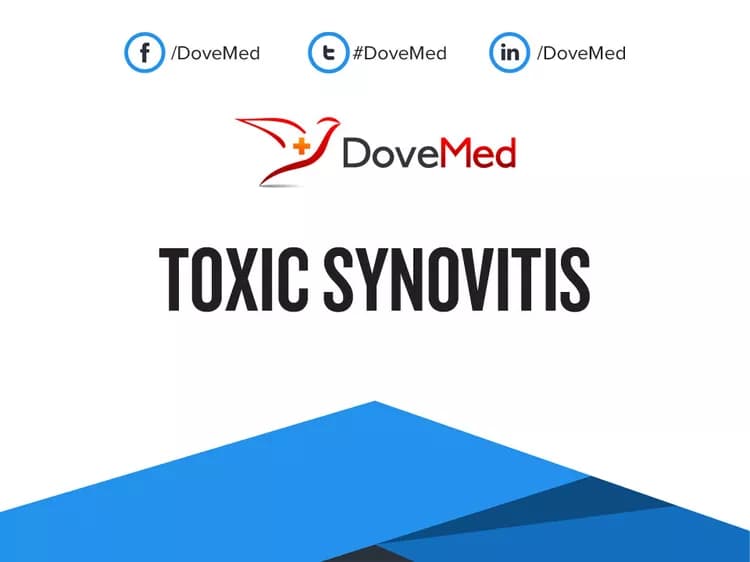What are the other Names for this Condition? (Also known as/Synonyms)
- Acute Transient Epiphysitis (causing Toxic Synovitis)
- Coxitis Serosa Seu Simple
- Transient Synovitis of the Hip (causing Toxic Synovitis)
What is Toxic Synovitis? (Definition/Background Information)
- Toxic Synovitis is an inflammatory condition that affects the hip joint of young children. It causes swelling of the hip joint and makes walking very difficult
- It may be described as a type of hip arthritis that causes hip pain and limping in children
- The cause of Toxic Synovitis is unknown; however, factors, such as trauma, post-vaccination and allergic reactions, and certain medications are thought to be risks for the condition
- Toxic Synovitis is a self-limiting and transient disorder that can be managed through non-steroidal anti-inflammatory medications and by limiting the physical activities for a certain period. The prognosis is generally excellent in a majority of affected children
Who gets Toxic Synovitis? (Age and Sex Distribution)
- Children in the age group of 3-10 years are most commonly affected by Toxic Synovitis; although, the condition may be seen in infants and adults too
- The condition affects children before the onset of puberty
- Commonly, boys are affected more than girls
- There is no racial or ethnic preference observed; all races and ethnic groups are at risk
What are the Risk Factors for Toxic Synovitis? (Predisposing Factors)
The following are the possible risk factors associated with Toxic Synovitis:
- History of trauma and injury
- Prior viral infection
- Post-vaccine reactions
- Reactions that occur due to an intake of a drug or medicine
- Certain allergic conditions
It is important to note that having a risk factor does not mean that one will get the condition. A risk factor increases one's chances of getting a condition compared to an individual without the risk factors. Some risk factors are more important than others.
Also, not having a risk factor does not mean that an individual will not get the condition. It is always important to discuss the effect of risk factors with your healthcare provider.
What are the Causes of Toxic Synovitis? (Etiology)
Currently, the exact cause of Toxic Synovitis development is unknown.
What are the Signs and Symptoms of Toxic Synovitis?
Toxic Synovitis is the most common cause of hip pain in children. The signs and symptoms manifested by the condition are:
- Hip pain on one side of the body
- Limping
- Pain in the thigh, knee
- Fever
How is Toxic Synovitis Diagnosed?
The following tests are conducted to diagnose and confirm Toxic Synovitis:
- Complete physical examination and evaluation of medical history
- Radiological imaging studies such as X-ray, ultrasound scan, MRI scan of the hip
- Blood tests such as erythrocyte sedimentation rate (ESR), C-reactive protein (CRP), and complete blood count (CBC)
- Aspiration of fluid from the hip joint: Fluid from the hip joint is drawn out and sent for testing in the laboratory
- Bone scan: It is an imaging test performed to measure the increase or decrease in bone metabolism
Many clinical conditions may have similar signs and symptoms. Your healthcare provider may perform additional tests to rule out other clinical conditions to arrive at a definitive diagnosis.
What are the possible Complications of Toxic Synovitis?
Toxic Synovitis resolves by itself, within a week or so, and it does not generally lead to any long-term complications.
How is Toxic Synovitis Treated?
The treatment and management of Toxic Synovitis may include:
- Limiting the physical activities of children
- Non-steroidal anti-inflammatory medications (NSAIDs), which include naproxen and ibuprofen, may be prescribed for reducing pain
How can Toxic Synovitis be Prevented?
Toxic Synovitis is a condition that cannot be prevented. It can only be managed by certain measures:
- Restraining or limiting certain physical activities of the child
- Administering suitable anti-inflammatory drugs
- Administering painkillers, as required
What is the prognosis of Toxic Synovitis? (Outcomes/Resolutions)
- The prognosis of Toxic Synovitis is generally good
- In most cases, the hip pain completely stops within a period of 7-10 days
Additional and Relevant Useful Information for Toxic Synovitis:
Since, Toxic Synovitis is a temporary, self-limiting disorder in children, it is also known as Transient Synovitis of the Hip.
Related Articles
Test Your Knowledge
Asked by users
Related Centers
Related Specialties
Related Physicians
Related Procedures
Related Resources
Join DoveHubs
and connect with fellow professionals


0 Comments
Please log in to post a comment.